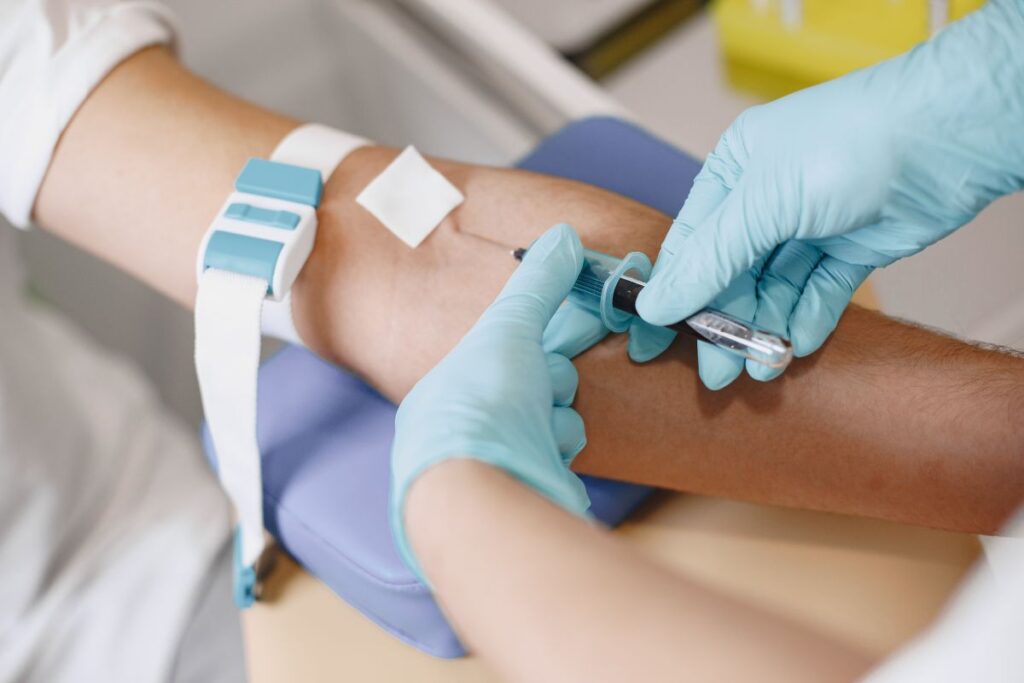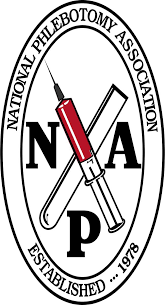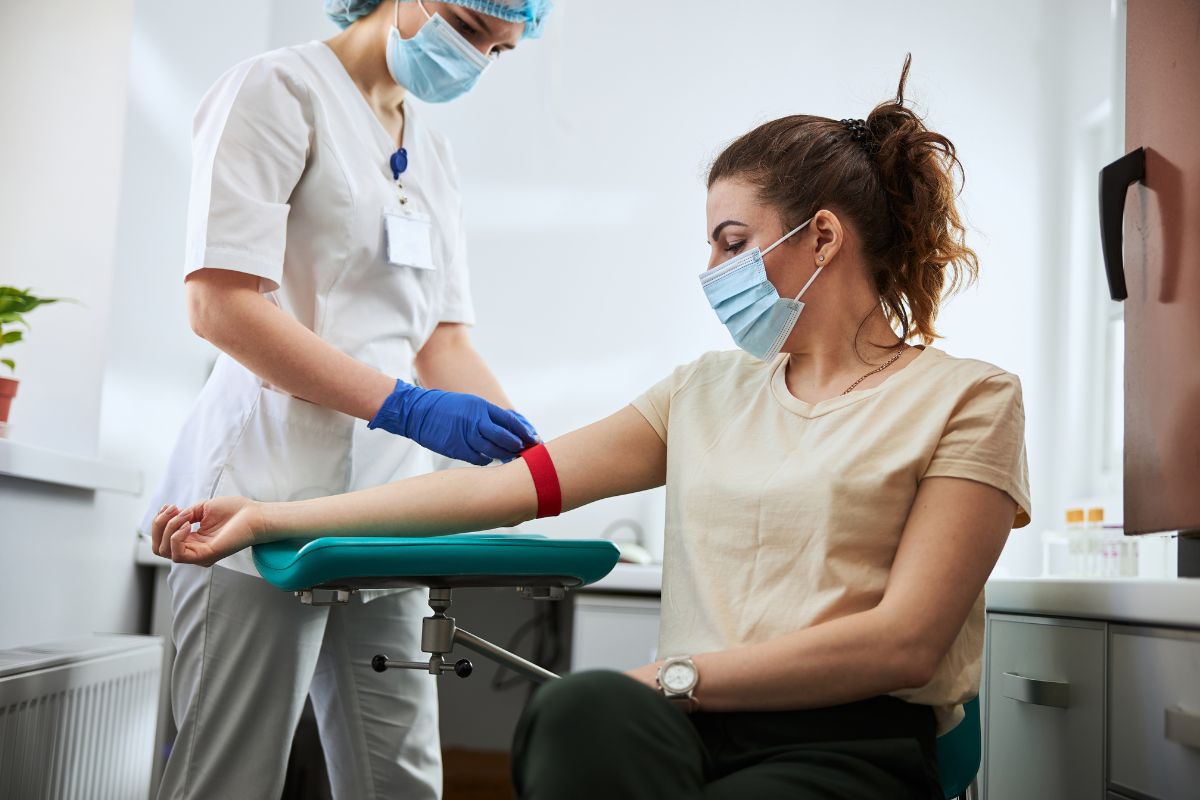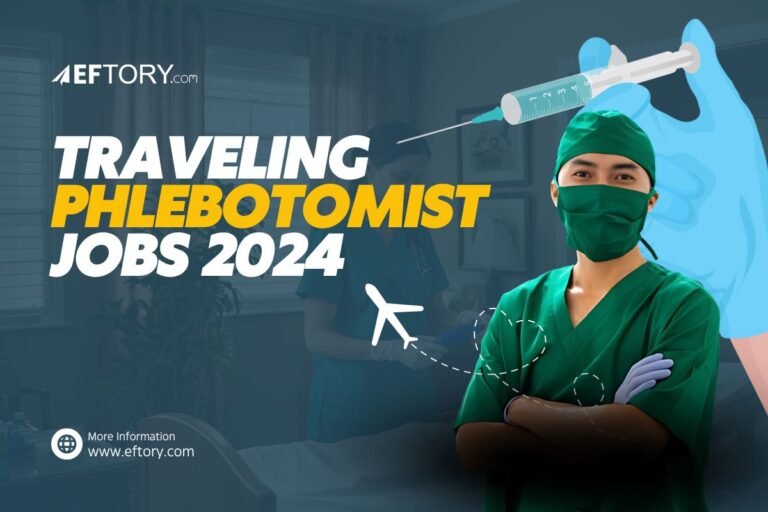Traveling Phlebotomist Jobs:
A traveling phlebotomist is a healthcare professional who specializes in drawing blood from patients but works in multiple locations, often within a particular region or even nationwide. These professionals typically work on temporary assignments or contracts and visit different healthcare facilities, blood donation centers, or patients’ homes.
Why Choose a Traveling Healthcare Career?
Working in the healthcare sector while traveling at the same time is quite appealing to many people as it has the potential to make work feel more like a vacation.
1. Professional Growth & Development:
- Diverse Experiences: Working in various healthcare settings, from rural clinics to urban hospitals, allows healthcare professionals to gain a wide range of experiences and enhance their skills.
- Learning Opportunities: Experience with a range of medical procedures, tools, and people results in enhanced educational and personal growth.
- Networking: As mentioned above, getting a chance to meet and work with people from different workplaces and different locations means building one’s professional network.
2. Higher Compensation & Benefits:
- Competitive Pay: Travelling health care workers for instance travelling phlebotomists tend to earn higher salaries than those assigned to fixed stations because of their flexibility to travel from one place to another.
- Travel Stipends and Housing: Some positions also have other perks such as travel grants, housing grants, meals, and daily allowances which can be so rewarding that the total compensation package becomes quite appealing.
3. Adventure & Exploration:
- New Destinations: Travelling to different places is one of the major advantages of healthcare job because it allows people to come across new places, states, or even nations, turning work assignments into mini-adventures.
- Cultural Exposure: Traveling in other countries or regions is always helpful to adopt completely different perspectives and exploring how other people live.
- Personal Enjoyment: For those people who love to travel will easily find a way to enjoy traveling by visiting different places and performing other related activities during their spare time.
4. Increased Job Opportunities:
- High Demand: As the global healthcare system evolves, there is a greater demand for traveling healthcare workers across various fields and geographical locations.
- Career Advancement: Such opportunities mean that one can acquire more experience and higher ranks in healthcare facilities in the future.

Responsibilities of Traveling Phlebotomist:
- Drawing Blood: Some of the tasks included taking blood samples from patients for the various tests that are conducted, blood donation, or for transfusion purposes.
- Patient Interaction: Helping patients understand their situations and making sure they are comfortable as well as addressing any of their worries.
- Sample Handling: Correct Identification and handling blood samples to prevent cross-contamination and any interferences with the testing process.
- Record Keeping: Keeping proper records of the patients including documents of collected samples.
- Travel Logistics: Coordinating travel arrangements, organizing time and ensuring timely availability at various places at a particular time.
How to Become a Traveling Phlebotomist?
Traveling phlebotomy provides a versatile working as a specialist who is able to perform blood collection of the patients, while traveling. Here’s a detailed look at the education, certification, and experience you’ll need to take flight:
Education:
Phlebotomy Technician Programs: The initial step that you are required to take as a phlebotomy technician is to enroll for a phlebotomy technician program. These are programs that are found in vocational schools, technical colleges, and even certain community colleges and typically take a few months to complete. They equip you with the knowledge and practical skills for safe and effective blood collection, including:
- Venipuncture techniques (This is the process of drawing blood from veins.)
- Anatomy and physiology of the circulatory system
- Collection, handling, and processing of blood specimens
- Safety measures to reduce health risks
Accreditation: Ensure your chosen program is accredited by a reputable organization like the Commission on Accreditation of Allied Health Education Programs (CAAHEP) [CAAHEP accreditation]. This accreditation demonstrates that this program has been offering quality education and meets the national standards of phlebotomy education.
Certification that Boost Your Credentials:
While not mandatory in all states, earning a national certification significantly strengthens your resume for travel phlebotomy positions:
Recognized Organizations: There are two highly recognized institutions offering phlebotomy technician certificates, these are:

- National Certifying Agency for Phlebotomy Technicians (NCCT): There is the National Phlebotomy Association (NPA) that offers certification based on the NCCT examination. This comprehensive exam showcases your knowledge and skills.
- American Society for Clinical Pathology (ASCP) Board of Certification (BOC): The ASCP BOC offers the Phlebotomy Technician (PBT (ASCP)) certification that validates proficiency in blood collection process.
Importance of Certification:
- An increased employment opportunity particularly for travel phlebotomy positions.
- Better chances of earning a higher salary.
- It shows that you are professional in your work and you are dedicated to performing your duties in the best way as possible.
- Specific Employer Preferences: Hiring agencies for travel phlebotomy might also have their preferences on whether one should be NCCT or ASCP certified. Take your time and search for potential employers to learn whether they have specific requirements.
Gain Experience: Sharpen Your Skills (Recommended)
While you can technically transition directly from training to travel phlebotomy, gaining experience in a fixed location like a hospital, clinic, or lab is highly recommended for several reasons:
- Develop Competency: You will get used to blood drawing exercises involving a variety of patients while being in a controlled situation.
- Build Confidence: Practicing blood draws several times will help in building confidence and ability to handle different situations.
- Enhances Patient Interaction: It will also enhance your communication and interpersonal skills to ensure that patients are made comfortable before blood samples are drawn from them.
Tips for Gaining Experience:
- Look for entry-level phlebotomy technician positions: There are always job vacancies in community hospitals, clinics, and doctors’ offices.
- Consider temporary or contract work: Phlebotomy staffing agencies can help you with securing short-term employment as a phlebotomist in different facilities.
- Volunteer at blood donation drives: Such drives are also important to gain experience with the blood collection and interacting with patients.
These are guidelines on the certification and experience to be gained in the process of becoming a competent traveling phlebotomist. Remember, staying up-to-date with the latest practices and maintaining your certifications is vital for continued success in this dynamic field.
Salary of Traveling Phlebotomist:
Hourly Wage:
- Lower Range: $20 per hour
- Median Range: $25 per hour
- Higher Range: $30 per hour
Annual Salary (assuming full-time work of 40 hours per week, 52 weeks per year):
- Lower Range: $41,600 per year
- Median Range: $52,000 per year
- Higher Range: $62,400 per year

Where to Find Traveling Phlebotomist Jobs?
There are several opportunities you can explore to find traveling phlebotomist jobs:
Healthcare Staffing Agencies:
These agencies operated within the context of providing healthcare professionals with temporary and contractual work such as traveling phlebotomy jobs.
- Aya Healthcare (Aya travel phlebotomist jobs)
- Aureus Medical Group (Aureus Medical phlebotomist jobs)
- Fusion Medical Staffing (Fusion Medical travel phlebotomist)
- SimplyHired (SimplyHired travel phlebotomist jobs)
- Allied Travel Careers (Allied Travel Careers phlebotomist jobs)
Job Boards:
Almost every job site provides search results for travel phlebotomy. Here are some popular options:
- Indeed.com
- Monster Jobs
- TravelNursing.com (focuses on travel healthcare jobs)
Direct Contact:
It may be helpful to try contacting travel nurse agencies or companies that provide mobile phlebotomy services. They might have travel phlebotomy positions available.
Networking:
Connect with other phlebotomists, particularly those who work as travelers. They might know about new jobs or agencies that they can suggest to you.
Professional Organizations:
The National Phlebotomy Association (NPA) and the American Society for Clinical Pathology (ASCP) might have resources or job boards for phlebotomists, including travel positions.
Challenges of Traveling Phlebotomist Jobs:
1. Frequent Travel (Bonus for Travelers but Tiring for those people who don’t like Traveling)
Frequent traveling can be Tiring and Stressful for some people. Constantly moving from one location to another can be physically and mentally exhausting. But I think this is a chance for travelers who want to explore the world along their job. As for me, as I love to travel this a golden chance.
2. Variable Hours & Changing Locations:
Schedules can be irregular and might change during the week, which can lead to unpredictable working hours. It can be rather tricky to keep on looking for new work environments and employers, and collaborating with new teams.
3. Temporary Jobs:
- Job Security: Many traveling phlebotomist positions are temporary contracts with unpredictable timeframes, which can result in gaps between jobs.
- Uncertainty: As these are not guaranteed jobs for an extended period so can lead to financial insecurity and stress.
Eftory’s Perspective:
I believe that nothing is easy in this world, these are potential challenges that people might face but if someone wants to travel and loves to explore different places like me, without disturbing their jobs or incomes, then these Traveling Phlebotomist jobs are a chance for that travelers as they can earn while traveling. As a Travel Blogger, I just want to make travel easy for my lovely travelers, so I think that these jobs can be a good option. Ultimately, the opinion is yours.
Frequently Asked Questions:
What is a traveling phlebotomist?
A traveling phlebotomist is a professional who travels to different locations to draw blood samples from patients. These workers are usually hired under short-term or long-term contracts.
What are the main duties of a traveling phlebotomist?
The duties of a traveling phlebotomist include drawing blood, interacting with patients, handling samples, and keeping records, etc.
Do traveling phlebotomists earn more than regular phlebotomists?
Yes, they often earn higher salaries because of the nature of the job as it involves lots of traveling.
How do I become a traveling phlebotomist?
You will need to complete a phlebotomy technician program, obtain the national certification (e.g., NCCT or ASCP), and gain some experience in a healthcare setting.
What are the benefits of being a traveling phlebotomist?
Benefits include different work experiences, higher pay, traveling and housing stipends, and opportunities for personal and professional growth.
Where can I find traveling phlebotomist jobs?
You can find jobs through healthcare staffing agencies, job boards (like Indeed and Monster), and professional organizations (like NPA and ASCP).
Is certification required for traveling phlebotomists?
While not always required, national certification is advisable to increase employment chances and earnings.
What kind of healthcare settings do traveling phlebotomists work in?
Traveling phlebotomists work in hospitals, clinics, blood donation centers, mobile labs, and patients’ homes.
Can traveling phlebotomists choose their assignments?
Often, yes. Most of staffing agencies provide phlebotomists with an open schedule and the ability to choose between different assignments.
What skills are important for a traveling phlebotomist?
Necessary skills include proficiency in blood drawing, strong social skills, flexibility, and excellent organizational abilities.






